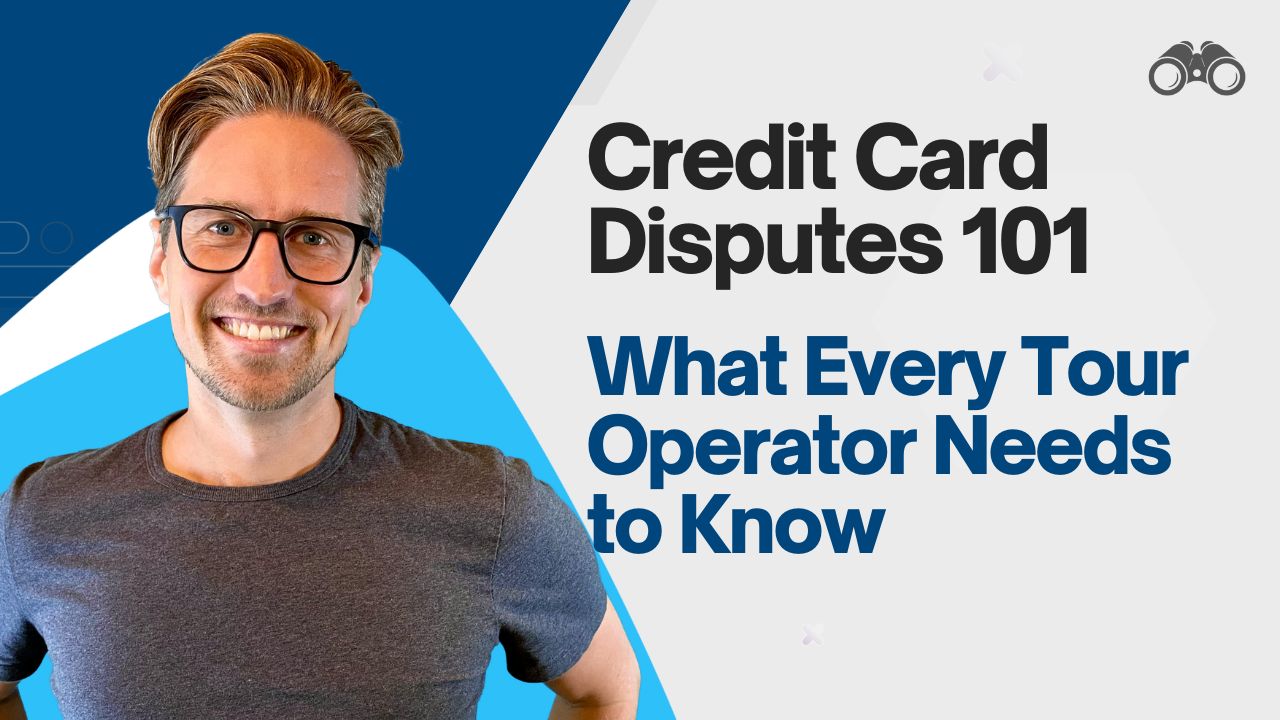Credit Card Disputes 101: What Every Tour Operator Needs to Know
This is the first of our three-part series on credit card disputes. Binge the series here!
Your whale watching tour went perfectly smooth—except for one detail: the whales didn’t get the memo and failed to show up. Three months later, a credit card dispute appears in your inbox.
Sound familiar? Credit card disputes are an inevitable part of running a tour business, but they don’t have to derail your day or drain your bank account.
The Truth About Credit Card Disputes
When a customer files a credit card dispute, they’re bypassing you entirely and going straight to their bank to challenge the charge. While this might feel personal, most disputes arise from genuine confusion rather than malicious intent. Understanding the process and having the right systems in place makes all the difference in protecting your business.
The Dispute Process Explained
When a dispute is filed, your booking software receives notification through their payment processor, and the funds are immediately pulled from your booking software’s account. The booking software then alerts you through your dashboard and pulls those funds from your account. This kicks off a process that typically follows these steps:
- You receive an email notification about the dispute
- Your booking software creates a dispute case in your dashboard
- The software helps collect and submit evidence on your behalf
- The funds are held in escrow during the bank’s review process
This process typically takes 60 to 120 days to resolve—that’s up to four months where those funds are in limbo, unavailable to either your business or the booking software.
Your Booking Software: Your First Line of Defense
If you’re using booking software—something we strongly recommend—you already have a powerful partner in managing these disputes. Companies like Peek Pro, FareHarbor, Checkfront, ResGo, and Rezdy have dedicated payment teams whose success is tied to yours. These teams work diligently to protect both their revenue and yours, as they often lose revenue when you lose a dispute.
When a dispute occurs, your booking software helps by:
- Creating a formal case file
- Gathering necessary evidence from your booking records
- Providing a system for submitting additional documentation
- Tracking the dispute status
- Managing financial arrangements
Consider the alternative: processing payments directly with a credit card processor or using an e-commerce plugin means handling all of these tasks yourself. Using booking software sets you up for success from the start.
Understanding Different Types of Disputes
Tour operators typically encounter three main categories of disputes:
Product Unacceptable
These disputes happen when customers claim the experience wasn’t as described. Common scenarios include weather impacts on hiking tours, no wildlife sightings during nature tours, equipment changes, route modifications, or differences in experience length. For example, a customer might dispute a charge because it rained during their hiking tour, or no whales appeared during their whale watching experience.
Services Canceled
Often related to cancellation policies, these disputes arise when customers miss your cancellation window but still want a refund. This category includes confusion about policies, guest no-shows claiming they canceled, group size changes, missing confirmation emails, or medical emergencies. These disputes often stem from misunderstandings about cancellation windows or policies.
Unrecognized Charges
Surprisingly common, these occur when your business name differs from your brand name on credit card statements. Sometimes a spouse books a tour using another family member’s card, or bookings made months in advance are forgotten. Even multiple family members booking different activities can lead to confusion when only one charge appears on a statement.
True Fraud vs. Friendly Fraud
Credit card companies distinguish between two types of fraud. True fraud involves unauthorized purchases with stolen credit card information – this is criminal fraud with malicious intent. Friendly fraud occurs when a legitimate cardholder makes a purchase but later disputes it. While some friendly fraud can be intentional, most cases stem from genuine confusion or misunderstanding.
The Critical Timeline
Speed matters when handling disputes. You typically have 7-10 days to respond with evidence, but the entire process can take 60-120 days to resolve. During this time, the disputed funds are held in escrow, unavailable to either party. This timeline remains consistent regardless of circumstances or evidence quality.
Building Your Evidence Package
Your evidence packet should include:
- Detailed booking information (date, time, product details, customer contact information)
- Cancellation policies
- Confirmation and reminder emails
- Check-in records
- Digital waivers
- Customer communications and chat message dialogs
- Photos or documentation of service delivery
For operators with physical locations, CCTV footage or photographs showing guests on premise can be valuable evidence. However, note that video and audio recordings typically aren’t accepted formats for bank submissions.
Frequently Asked Questions
Common questions from operators new to disputes include:
What if my customer drops the dispute? Even if a customer withdraws their dispute, you must still complete the full process, including submitting the evidence packet. The process will still take up to 90 days, even with written confirmation from the customer about withdrawing the dispute.
Can I issue a partial refund on a disputed booking? Generally, no. Once a dispute is filed, the funds are pulled into escrow, removing your ability to process refunds. This emphasizes the importance of addressing customer concerns before they escalate to a dispute.
What if I’ve already refunded the booking? This happens more often than you might think. Your booking software can help provide evidence of the prior refund in your submission packet.
The Real Cost of Disputes
The financial impact of disputes goes beyond the immediate charge. You face:
- Loss of access to funds for 3-4 months
- Potential loss of the disputed amount
- Additional processing fees from booking software or bank chargeback fees
- Time and energy spent on customer communication and evidence collection
However, with proper systems and documentation in place, you can minimize their frequency and maximize your chances of successful resolution. Remember, your booking software is your partner in this process. Their success often depends on yours, making them a valuable ally in preventing and managing disputes effectively.
The key to managing disputes successfully lies in understanding the process, maintaining thorough documentation, and acting quickly when disputes arise. While you can’t prevent all disputes, you can create systems that protect your business and maintain positive relationships with your guests.




